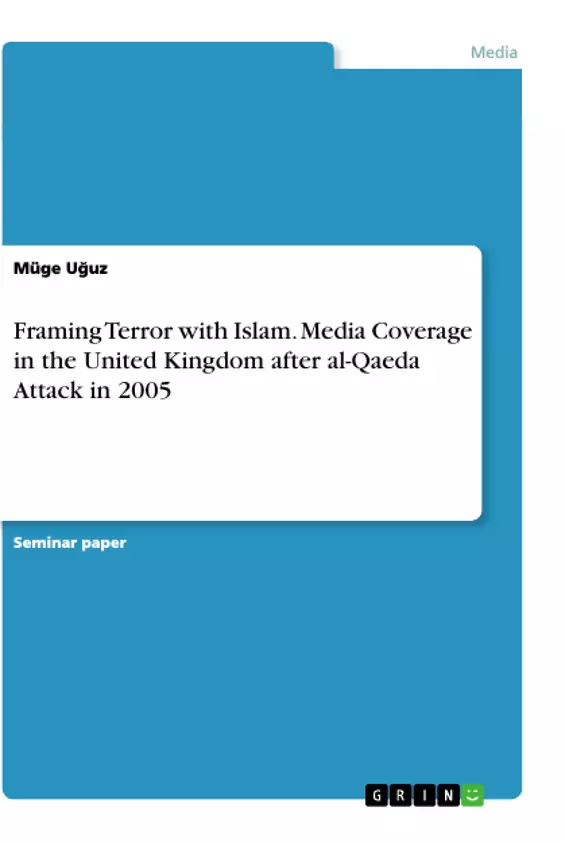In this paper, the framing and representation of Muslims while covering terror issues in the UK media are examined. The impact on the Muslim community, their responses, and Islamophobia are explained. A comparison is made between the UK and US framing and lastly, contradictory findings in several research studies are discussed.
Media coverage on terror includes specific framing methods that emphasized the relation between Islam and terror incidents. Since media has a crucial role to shape society’s understanding, the method of framing in such a way conduces disintegration among society in terms of Muslim and non-Muslim by focusing on the “us” “them” distinction and emphasize a connection between Islam and terrorism.
Terror itself is a controversial issue that many states try to deal with and the media has the ability to influence counterterror endeavors as well as society’s perspective. “Communication and media are as important to the terrorist and the government as the actual act of violence itself. Therefore analysis of news coverage and its implications are crucial for counterterrorism efforts”. That’s why it is significant to cover the subject especially for the United Kingdom who has experienced organised violence by the extra-state, interstate, and intrastate actors. However, since this paper focuses on framing that specifies a relationship between Islam and terror in the UK, the 7/7 (2005) attack on civilians in London is the most relevant one to study, especially after the 9/11 (2001) attack in the United States.
Inhaltsverzeichnis (Table of Contents)
- Introduction
- Framing terror with Islam in the United Kingdom
- The Effects on Muslims and Islamophobia
- Conclusion
Zielsetzung und Themenschwerpunkte (Objectives and Key Themes)
This paper examines how media coverage in the United Kingdom frames terrorism with Islam, focusing on the 2005 al-Qaeda attacks in London. The author explores the impact of this framing on Muslim communities in the UK, including their responses and the rise of Islamophobia.
- Media framing and its role in shaping public perception of terrorism and Islam
- The relationship between media representation, discrimination, and Islamophobia
- The impact of media coverage on Muslim identity, integration, and civil liberties
- The role of specific media outlets in shaping the narrative of Islam and terrorism
- Contradictory findings in research studies regarding media framing and Islamophobia
Zusammenfassung der Kapitel (Chapter Summaries)
- Introduction: This section introduces the topic of media framing in relation to terrorism and its impact on societal understanding of Islam. It highlights the importance of media analysis in counterterrorism efforts and sets the context for the 7/7 (2005) London attacks as a key case study.
- Framing terror with Islam in the United Kingdom: This chapter examines how the UK media attributes terrorism to Islam, particularly after the 2005 al-Qaeda attacks. It discusses the role of specific media outlets in promoting discriminatory narratives and reinforcing the "us" vs. "them" framework.
- The Effects on Muslims and Islamophobia: This chapter analyzes the negative impact of media representation on Muslim communities in the UK, exploring the rise of Islamophobia, its consequences for integration, and how it affects Muslim identity and civil liberties.
Schlüsselwörter (Keywords)
Media framing, terrorism, Islam, Islamophobia, counterterrorism, 7/7 attacks, al-Qaeda, UK media, discrimination, integration, Muslim identity, civil liberties, societal perceptions, media representation.
Frequently Asked Questions
How did the UK media frame the 2005 London attacks?
The media often used framing methods that emphasized a direct connection between Islam and the terror incidents, reinforcing an "us" vs. "them" narrative.
What is the impact of this media framing on Muslim communities?
It has led to increased Islamophobia, social disintegration, and challenges regarding the integration and civil liberties of Muslims in the UK.
Why is media analysis important for counterterrorism?
Media shapes public perception and can influence government policy; therefore, understanding how news coverage works is crucial for effective counterterrorism efforts.
Are there differences between UK and US media framing of terror?
The paper provides a comparison between the two, noting how both countries experienced major attacks (9/11 and 7/7) that shaped their respective media landscapes.
What are the contradictory findings mentioned in the research?
The paper discusses various studies that show differing results on the extent and direct consequences of media framing on societal Islamophobia.
- Citation du texte
- Müge Uğuz (Auteur), 2020, Framing Terror with Islam. Media Coverage in the United Kingdom after al-Qaeda Attack in 2005, Munich, GRIN Verlag, https://www.grin.com/document/987293



